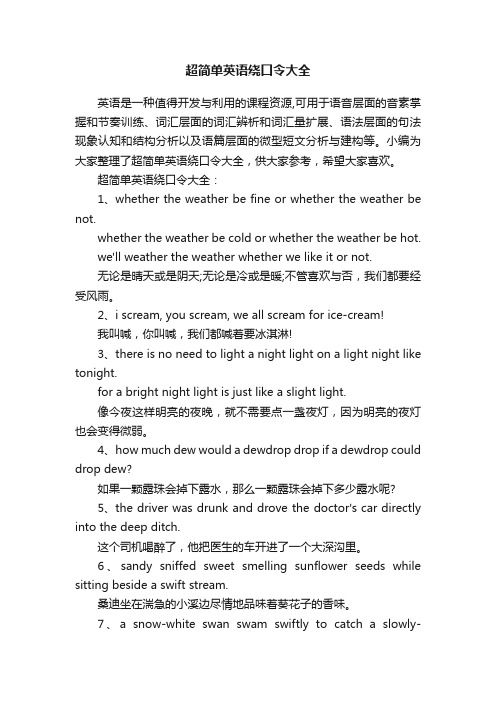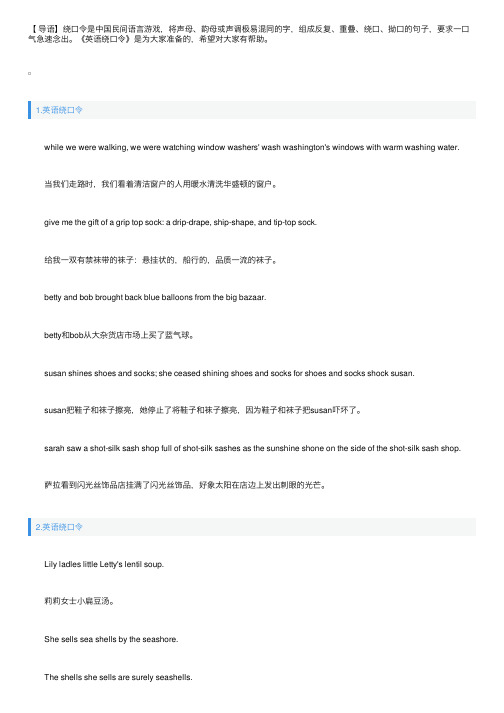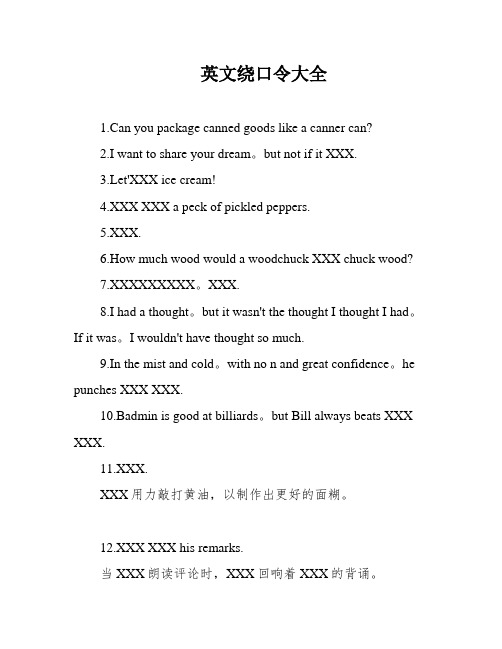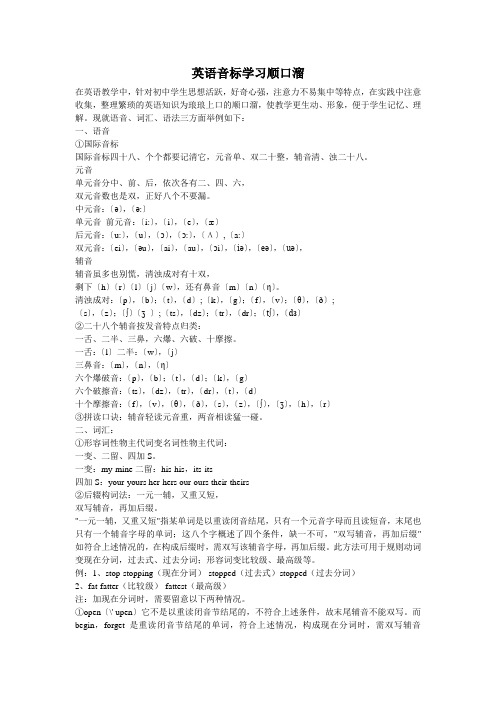英语语法记忆绕口令
超简单英语绕口令大全

超简单英语绕口令大全英语是一种值得开发与利用的课程资源,可用于语音层面的音素掌握和节奏训练、词汇层面的词汇辨析和词汇量扩展、语法层面的句法现象认知和结构分析以及语篇层面的微型短文分析与建构等。
小编为大家整理了超简单英语绕口令大全,供大家参考,希望大家喜欢。
超简单英语绕口令大全:1、whether the weather be fine or whether the weather be not.whether the weather be cold or whether the weather be hot.we'll weather the weather whether we like it or not.无论是晴天或是阴天;无论是冷或是暖;不管喜欢与否,我们都要经受风雨。
2、i scream, you scream, we all scream for ice-cream!我叫喊,你叫喊,我们都喊着要冰淇淋!3、there is no need to light a night light on a light night like tonight.for a bright night light is just like a slight light.像今夜这样明亮的夜晚,就不需要点一盏夜灯,因为明亮的夜灯也会变得微弱。
4、how much dew would a dewdrop drop if a dewdrop could drop dew?如果一颗露珠会掉下露水,那么一颗露珠会掉下多少露水呢?5、the driver was drunk and drove the doctor's car directly into the deep ditch.这个司机喝醉了,他把医生的车开进了一个大深沟里。
6、sandy sniffed sweet smelling sunflower seeds while sitting beside a swift stream.桑迪坐在湍急的小溪边尽情地品味着葵花子的香味。
英语绕口令大全经典【精选5篇】

【导语】绕⼝令是中国民间语⾔游戏,将声母、韵母或声调极易混同的字,组成反复、重叠、绕⼝、拗⼝的句⼦,要求⼀⼝⽓急速念出。
《英语绕⼝令》是为⼤家准备的,希望对⼤家有帮助。
1.英语绕⼝令 while we were walking, we were watching window washers' wash washington's windows with warm washing water. 当我们⾛路时,我们看着清洁窗户的⼈⽤暖⽔清洗华盛顿的窗户。
give me the gift of a grip top sock: a drip-drape, ship-shape, and tip-top sock. 给我⼀双有禁袜带的袜⼦:悬挂状的,船⾏的,品质⼀流的袜⼦。
betty and bob brought back blue balloons from the big bazaar. betty和bob从⼤杂货店市场上买了蓝⽓球。
susan shines shoes and socks; she ceased shining shoes and socks for shoes and socks shock susan. susan把鞋⼦和袜⼦擦亮,她停⽌了将鞋⼦和袜⼦擦亮,因为鞋⼦和袜⼦把susan吓坏了。
sarah saw a shot-silk sash shop full of shot-silk sashes as the sunshine shone on the side of the shot-silk sash shop. 萨拉看到闪光丝饰品店挂满了闪光丝饰品,好象太阳在店边上发出刺眼的光芒。
2.英语绕⼝令 Lily ladles little Letty's lentil soup. 莉莉⼥⼠⼩扁⾖汤。
She sells sea shells by the seashore. The shells she sells are surely seashells. So if she sells shells on the seashore, I'm sure she sells seashore shells. 她在海滩卖海贝壳, 她卖的贝壳是真的海贝壳。
独家私藏多年的英文绕口令资料 最全~

英语绕口令:1. Can you can a can as a canner can can a can?你能够像罐头工人一样装罐头吗?2. I wish to wish the wish you wish to wish, but if you wish the wish the witch wishes, I won't wish the wish you wish to wish.我希望梦想着你梦想中的梦想,但是如果你梦想着女巫的梦想,我就不想梦想着你梦想中的梦想。
3. I scream, you scream, we all scream for ice-cream!我叫喊,你叫喊,我们都喊着要冰淇淋!4. How many cookies could a good cook cook if a good cook could cook cookies?A good cook could cook as much cookies as a good cook who could cook cookies.如果一个好的厨师能做小甜饼,那么他能做多少小甜饼呢?一个好的厨师能做出和其它好厨师一样多的小甜饼。
5. The driver was drunk and drove the doctor's car directly into the deep ditch. 这个司机喝醉了,他把医生的车开进了一个大深沟里。
6. Whether the weather be fine or whether the weather be not.Whether the weather be cold or whether the weather be hot.We'll weather the weather whether we like it or not.无论是晴天或是阴天。
无论是冷或是暖,不管喜欢与否,我们都要经受风霜雨露。
英文绕口令大全

英文绕口令大全1.Can you package canned goods like a canner can?2.I want to share your dream。
but not if it XXX.3.Let'XXX ice cream!4.XXX XXX a peck of pickled peppers.5.XXX.6.How much wood would a woodchuck XXX chuck wood?7.XXXXXXXXX。
XXX.8.I had a thought。
but it wasn't the thought I thought I had。
If it was。
I wouldn't have thought so much.9.In the mist and cold。
with no n and great confidence。
he punches XXX XXX.10.Badmin is good at billiards。
but Bill always beats XXX XXX.11.XXX.XXX用力敲打黄油,以制作出更好的面糊。
12.XXX XXX his remarks.当XXX朗读评论时,XXX回响着XXX的背诵。
13.Only a XXX.只有几只果蝇成功逃离了火焰。
14.XXX XXX.轻轻漂浮的战舰上自豪地挂着五十五面飘扬的旗帜。
15.XXX。
there is no need for a night light。
as a bright night light is just like a slight light.像今晚这样明亮的夜晚,不需要夜灯,因为明亮的夜灯就像微弱的光。
5.XXX's car into a deep ditch.这个醉酒的司机粗心地把医生的车开进了一个深深的沟里。
6.XXX。
XXX it's cold or hot。
英语语法绕口令

巧记英语语法口诀二十一首1、英语的词类句子要由词组成,英语词类有十种:句中成分用实词,名、代、动、副、数、形容:冠、介、连词和感叹,虚词附加或沟通。
词类功能掌握了,造句之时好运用。
2、语序歌主、谓、宾、表同汉语,定语有同也有异。
状语位置更特殊,不能全和汉语比。
3、肯定句变一般疑问句have和be提句首,其它助词Do开头。
时间、人称由do变,动词只把原形留。
谓语助词有几个,第一助词提句首。
4、肯定句变否定句否定词语加not,放在be和have后。
其它要加动词do, do的后面加not,时间、人称由do变,动词原形总保留。
谓语若是助词多, not紧跟第一个。
5、名词的所有格名词只变数,不分主宾格。
人和动物类,可变所有格。
撇(’)后加s,相当汉语“的”。
时间、距离等,也变所有格。
6、名词变复数单数变为复数式,加上“s”统言之。
下列结尾名词后,要加“s”先加“e”:发音[∫][t∫][s]和[z],或是辅音加“o”时。
有些名词变复数,词尾变化要注意:“y”前字母是辅音,一律变“y”为“ie”;遇到“f / fe”,有时需要变“ve”少数名词不规则,特别情况靠硬记。
7、时间名词前所有介词的速记年月周前要用in,日子前面却不行。
遇到几号要用“on”,上午下午又是“in”。
要说某日上下午,用on 换in 才能行。
午夜黄昏用at,黎明用它也不错。
at 也在时分前,说“差”用to,说“过”要用past。
8、介词用法歌介词加宾语,才能有实意。
表、定、状、宾、补,词组在句里。
9、介词顺口溜in 在……里, out 在……外,在旁边的是beside,靠近的为by。
on 在……上, under 在……下, above 在上头, below 在底下。
10、be的用法歌动词be,变化大,“I”用“am”“You”用“are” Is用于它(it)、他(he)、她(she)复数一定要用“are”,切莫用错闹笑话。
11、动词的时态四种时间各四式,联想对比便于记。
英语必备顺口溜 学会英语全部语法知识

英语必备顺口溜学会英语全部语法知识全文共3篇示例,供读者参考篇1English Must-Have Tongue Twisters: Master All Grammar RulesLooking to get a better grasp of the English language? What better way to do so than by mastering some tongue twisters that cover all the grammar rules! Tongue twisters are a fun and effective way to improve your pronunciation, fluency, and overall understanding of the language. So let's dive in and explore some must-have English tongue twisters that cover all the essential grammar rules.1. She sells seashells by the seashore. (Present Simple)This classic tongue twister is a great way to practice the present simple tense. By repeating this sentence over and over, you can improve your pronunciation and reinforce your understanding of how to form present simple sentences.2. Peter Piper picked a peck of pickled peppers. (Past Simple)Practice your past simple tense with this tongue twister. Focus on the correct pronunciation of the past tense verbs and nail down the tricky irregular verb forms.3. How can a clam cram in a clean cream can? (Present Perfect)Challenge yourself with this tongue twister that focuses on the present perfect tense. Pay attention to how the present perfect is formed and used in this sentence to improve your grasp of this essential grammar rule.4. Fuzzy Wuzzy was a bear. Fuzzy Wuzzy had no hair. Fuzzy Wuzzy wasn't very fuzzy, was he? (Past Perfect)This tongue twister offers a fun way to practice the past perfect tense. Pay close attention to the use of "had" to show an action that took place before another past action.5. The sixth sick sheik's sixth sheep's sick. (Possessive Pronouns)Test your knowledge of possessive pronouns with this tricky tongue twister. Practice saying "sheik's" and "sheep's" clearly and correctly to master this grammar rule.6. Betty Botter bought some butter, "But," she said, "This butter's bitter. If I put it in my batter, it will make my batter bitter." (Conditionals)This tongue twister is a great way to practice your understanding of conditionals. Focus on the use of "if" and the consequences that follow to improve your grasp of this grammar rule.7. A proper copper coffee pot. (Consonant Clusters)Challenge yourself with this tongue twister that focuses on consonant clusters. Practice saying words with multiple consonants in a row to improve your pronunciation and fluency.8. How much wood would a woodchuck chuck if a woodchuck could chuck wood? (Modal Verbs)This tongue twister is a great way to practice using modal verbs. Focus on the use of "would" and "could" to express possibility and ability in this sentence.9. Eight great lakes and five small oceans. (Countable and Uncountable Nouns)Practice your understanding of countable and uncountable nouns with this tongue twister. Pay attention to how "lakes" and"oceans" are used differently in this sentence to master this grammar rule.10. Six slippery snails slid slowly seaward. (Adjectives and Adverbs)Challenge yourself with this tongue twister that focuses on adjectives and adverbs. Practice using descriptive words to enhance your language skills and improve your overall fluency.By mastering these English tongue twisters that cover all the essential grammar rules, you'll be well on your way to becoming a fluent and confident English speaker. So grab a friend and start practicing these tongue twisters today to take your language skills to the next level!篇2English Grammar Tongue TwistersLearning English grammar can be a challenging task, but with the use of tongue twisters, you can make the process more enjoyable and effective. Here are some tongue twisters that cover different aspects of English grammar, from tenses to prepositions, to help you improve your grammar skills.1. Present Simple vs. Present ContinuousPeter Piper picks a peck of pickled peppers.How many pickled peppers did Peter Piper pick?This tongue twister can help you differentiate between the present simple and present continuous tenses. The first line is in the present simple tense ('Peter Piper picks'), while the second line is in the present continuous tense ('did Peter Piper pick').2. PrepositionsShe sells seashells by the seashore.The shells she sells are surely seashells.This tongue twister focuses on prepositions and can help you practice using prepositions like 'by' and 'at'.3. ArticlesA good cook could cook as much cookies as a good cook who could cook cookies.A good cook could cook cookies as a good cook who could cook cookies could cook.This tongue twister can help you practice using articles like 'a' and 'the' correctly in sentences.4. Subject-Verb AgreementBetty Botter bought some butter, bu t she said the butter’s bitter.If I put it in my batter, it will make my batter bitter.This tongue twister can help you practice subject-verb agreement by focusing on the correct forms of verbs that agree with their subjects.5. Past Simple vs. Present PerfectHow much wood would a woodchuck chuck if a woodchuck could chuck wood?He would chuck as much wood as a woodchuck would if a woodchuck could chuck wood.This tongue twister can help you distinguish between the past simple and present perfect tenses.6. Plural NounsSally sells seashells by the seashore.The shells she sells are surely seashells.So if she sells shells on the seashore,I'm sure she sells seashore shells.This tongue twister can help you practice making plural nouns in English.7. Adjectives OrderShe saw a saw that was so sharp, that she saw ...She saw a sharp saw, that was so sharp, that she saw.This tongue twister can help you practice the correct order of adjectives in English sentences.By practicing these tongue twisters regularly, you can improve your English grammar skills and become more fluent in using the language. Have fun with them and watch your grammar knowledge grow!篇3English is a fascinating language with many rules and structures, and mastering all its grammar knowledge can be quite a daunting task. However, there are some handy rhymes and mnemonics that can help you remember key grammar rules and concepts. Here are some essential English grammar rhymes that you can use to improve your language skills.1. "I before E, except after C, or when sounded as A, as in neighbor and weigh." This classic rhyme can help you remember the spelling rule for words with 'ie' and 'ei'.2. "A verb's what's happening, an action or state, like 'run' or 'jump' or 'is' or 'ate'." This simple rhyme can remind you that a verb is a word that expresses an action or state of being.3. "Noun is a person, place, or thing, like 'dog' or 'tree' or'wedding ring'." This mnemonic can help you remember that a noun is a word that names a person, place, thing, or idea.4. "Adjectives describe, like 'red' or 'small', they answer the question 'Hey, what kind of ball?'" This rhyme can help you remember that adjectives are words that describe or modify nouns.5. "Adverbs tell how, when, where, or why, like 'quickly' or 'always' or 'up in the sky'." This handy rhyme can remind you that adverbs modify verbs, adjectives, or other adverbs.6. "A preposition shows relation, like 'in', 'on', 'under', or'beside'." This rhyme can help you remember that prepositions are words that show the relationship between a noun or pronoun and other words in a sentence.7. "Conjunctions connect, like 'and' or 'but', they link words and phrases, like peanut butter and jelly." This mnemonic can remind you that conjunctions are words that connect words, phrases, or clauses.8. "A pronoun takes the place of a noun, like 'he', 'she', or 'it' in a tune." This simple rhyme can help you remember that pronouns are words that substitute for nouns.9. "A subject is who or what does the verb, like 'John' or 'dog' or 'the screaming herd'." This rhyme can help you remember that the subject of a sentence is the person or thing that performs the action of the verb.10. "An object receives the action, like 'ball' or 'cake' or 'a warm affection'." This mnemonic can remind you that the object of a sentence is the person or thing that is affected by the action of the verb.By using these rhymes and mnemonics, you can improve your English grammar skills and remember key rules and concepts more easily. Practice using them in your studies and conversations, and soon you'll be speaking and writing English with confidence and accuracy. Remember, learning a language is a journey, and every step you take brings you closer to fluency. Good luck!。
英语语法顺口溜记忆法

英语语法顺口溜记忆法先说名词所有格,表示物品所属有定说,单数复数分两套,【s】加在末尾头。
如果没有定语限,名词所有自己说,【of】是万金油,自己能管莫乱插足。
再说定语从句表并列,as作主从不先行,句子缺少主语时,which才能显本领。
先写主句莫疏忽,从句自带成分多,从句补充要切记,从句前写引导词。
关系代词有四个,which, that, who, whose, who放在主语位,who不带作宾语。
that偶尔带宾语,但是表强调时现。
Whose作定语后置,表示所属关系妥。
再说状语从句范围大,主从句间逻辑差,从句自带成分多,时间地点最常见。
条件、让步状语从,if, unless, though, whether. as, so…as…常出现。
何时不与if连?弱词替换它为伴。
接着谈论动词时态,动作发生时间分明确,过去现在未来三种,根据事实选合适。
一般现在时陈述常,习惯动作真实态。
过去发生用过去时,过去完成表顺序。
未来即将发生事,一般将来时表述齐。
过去将来无奇异,虚拟语气表假设。
谈论被动语态,被动关系要明了,动作承受者为主语。
被动语态分三种,根据需要选合适。
一般现在被动语,习惯动作可陈述。
过去被动表经历,未完成时表推测。
将来被动不用急,虚拟语气表建议。
接着讲述情态动词,语气强度分等级,可能性大小随语境。
情态动词助表达,can, may, must, should,各自含义有区别。
can表示能力情,may表请求许可情。
must强调必须意,should表建议责。
最后谈谈虚拟语气,表达假设条件式,根据事实反事实选。
虚拟语气分多种,if 条件从句辨。
主句谓语动词情,从句事实陈述清。
主句谓语动词意,从句假设细区分。
掌握虚拟语气法,英语表达更灵活。
通过以上顺口溜,英语语法掌握易,日积月累运用熟,英语水平步步高。
学习语法要耐心,多多练习巩固深,交流无阻游世界,英语成就未来路。
英语音标学习技巧-顺口溜绕口令

英语音标学习顺口溜在英语教学中,针对初中学生思想活跃,好奇心强,注意力不易集中等特点,在实践中注意收集,整理繁琐的英语知识为琅琅上口的顺口溜,使教学更生动、形象,便于学生记忆、理解。
现就语音、词汇、语法三方面举例如下:一、语音①国际音标国际音标四十八、个个都要记清它,元音单、双二十整,辅音清、浊二十八。
元音单元音分中、前、后,依次各有二、四、六,双元音数也是双,正好八个不要漏。
中元音:〔ә〕,〔ә:〕单元音前元音:〔i:〕,〔i〕,〔e〕,〔æ〕后元音:〔u:〕,〔u〕,〔ɔ〕,〔ɔ:〕,〔Λ〕,〔a:〕双元音:〔ei〕,〔әu〕,〔ai〕,〔au〕,〔ɔi〕,〔iә〕,〔eә〕,〔uә〕,辅音辅音虽多也别慌,清浊成对有十双,剩下〔h〕〔r〕〔l〕〔j〕〔w〕,还有鼻音〔m〕〔n〕〔η〕。
清浊成对:〔p〕,〔b〕;〔t〕,〔d〕;〔k〕,〔g〕;〔f〕,〔v〕;〔θ〕,〔ð〕;〔s〕,〔z〕;〔∫〕〔ʒ〕;〔ts〕,〔dz〕;〔tr〕,〔dr〕;〔t∫〕,〔dз〕②二十八个辅音按发音特点归类:一舌、二半、三鼻,六爆、六破、十摩擦。
一舌:〔l〕二半:〔w〕,〔j〕三鼻音:〔m〕,〔n〕,〔η〕六个爆破音:〔p〕,〔b〕;〔t〕,〔d〕;〔k〕,〔g〕六个破擦音:〔ts〕,〔dz〕,〔tr〕,〔dr〕,〔t〕,〔d〕十个摩擦音:〔f〕,〔v〕,〔θ〕,〔ð〕,〔s〕,〔z〕,〔∫〕,〔ʒ〕,〔h〕,〔r〕③拼读口诀:辅音轻读元音重,两音相读猛一碰。
二、词汇:①形容词性物主代词变名词性物主代词:一变、二留、四加S。
一变:my-mine二留:his-his,its-its四加S:your-yours her-hers our-ours their-theirs②后辍构词法:一元一辅,又重又短,双写辅音,再加后缀。
"一元一辅,又重又短"指某单词是以重读闭音结尾,只有一个元音字母而且读短音,末尾也只有一个辅音字母的单词;这八个字概述了四个条件,缺一不可,"双写辅音,再加后缀"如符合上述情况的,在构成后缀时,需双写该辅音字母,再加后缀。
- 1、下载文档前请自行甄别文档内容的完整性,平台不提供额外的编辑、内容补充、找答案等附加服务。
- 2、"仅部分预览"的文档,不可在线预览部分如存在完整性等问题,可反馈申请退款(可完整预览的文档不适用该条件!)。
- 3、如文档侵犯您的权益,请联系客服反馈,我们会尽快为您处理(人工客服工作时间:9:00-18:30)。
英语语法记忆歌一般现在时一般现在时态中,动词一般用原形。
表述事实讲真理,习惯动作常发生。
动词词尾加-s(es),只表单数三人称。
若变一般疑问句,得看句型是哪种。
系表结构和there be, be放句首可完成;若遇实义动词句,do或does莫忘用!现在进行时Look, Listen是标志,现在进行正发生;有时now在句中现,“be+v-ing”时态成。
若问be用何形式,须看主语数、人称。
He/She is, I am.We, you, they后are紧跟。
v-ing形式更好记,三种构成要分清。
一般问句be提前,be后加not否定成!基数词变序数词基变序,很容易,一二三,特殊记,th从四起。
八去t来九去e,遇到ve,f 替,ty变为tie,后加th莫迟疑,若想表示几十几,只变个位就可以。
时间介词巧记歌年、月、季节前须用in,(如:in 2008, in September, in spring)日期前面行不通。
遇到几号改用on,(如:on January 1)上午、下午、晚上仍用in。
(如:in the morning/afternoon/evening) 若是某日上下午,也是用on才能行。
(如:on the evening of the Mid-autumn Day)正午、夜里用at,(如:at noon, at night)时、分用法也同理。
(如:, at two, at two)如若“差”点须加to,(如:two to two)如若“过”点改past。
(如:half past one)多说勤练牢牢记,学好英语非儿戏。
谓语be的用法我用am,你用are除此之外的单数包括他她还有它统统都是用is我们你们和他们只要复数都用are一般疑问句和否定句的变化一般问句并不难,谓语调到主语前。
大写小写有变化,句末要把问号加。
第一人称常变二。
否定句就更简单,中间加上一not,谓语动词提到前。
现在进行时现在进行时很好记,结构be+动词ing。
be由主语来决定,句中常用标志词,now,look,listen!一般现在时肯定句的现在式。
不是三单用原形,是三单就加s,es,若是否定疑问句,没有be就加个do,碰到三单加does。
如把does加在前,动词就要还原形。
一般过去时肯定句的过去式。
规则动词加ed,不规则的必须记。
否定形式疑问句,没有be加did。
如把did加在前,动词也要还原形。
特殊的形容词、副词的比较级、最高级一分为二有两个,一是远来一是老。
合二为一共三对,坏病两多并两好。
还有一词双意含,只译少来不译小。
比较等级的运用原级用在as…as间,比较级用在than前。
and连接两个比较级,说明“越来越怎样”。
三者以上最高级,副词前可不加the。
Even, much和a little,也常修饰比较级。
宾语从句宾语从句三要素,引导词、语序、时态。
引导词分三情况,陈述句that可省略。
一般疑问句if或whether。
碰到特殊疑问句,疑问词来担此任。
语序总体为主谓。
疑问词从句主语,语序不必去改变。
从句时态主句定,如果主句是过去,从句相应作改变,客观真理仍现在。
被动语态被动语态牢记一点,be加动词过去分词。
分析句中主和谓,承受者作主语即被动。
短语动词不可忘介、副词。
另有不及物动词,只有主动无被动。
还要注意其时态,与主动语态全相同。
教冠a, an, thea,an,the是冠词,就像帽子扣名词;元音因素要扣an,辅音因素要扣a;an/a用来泛泛指,the是特指常牢记。
进行时顺口溜进行时,抓动词,动词前面是助词(be);动词的后面是ing,三位一体别忘记。
形容词性物主代词物主代词很重要,译成汉语都有“的”;后面必须加上物,否则就要犯错误;my,your,his,her,its,our,their不放过.be的几个顺口溜(1)我用am,你用are,单三is,复数are。
(2)I用am,you用are,非I非you是is,复数全部都用are。
(3)代词主格的顺口溜:I是我来we复数,你和你们都用you;he,she,it男、女、它,复数一律把they用。
过去时的动词"一改、二多、三少、四刚刚好"即有规则的一般过去时的动词,一改,以"y"结尾,把"y"去掉改为"i"再加"ed",如:"study"→"studied";二多,重读闭音节,双写末尾辅音字母再加"ed",如:"stop"→"stopped";三少,以不发音"e"字母结尾的动词,可直接加上"d",如:"live"→"lived";四刚刚好,就是直接加上"ed ",如:"work"→"worked" .冠词用法一、定冠词的用法。
特指双熟悉,上文已提及;世上独无二,序数最高级;某些专有名,习语及乐器。
以上口诀归纳了用定冠词的一般情况,即:①特指某些人或物②谈话双方都熟悉的人或事③上文已经提到的人或事④世界上独一无二的事物前⑤序数词回形容词最高级前⑥某些专有名词前⑦一些习惯短语(如:in the day等)中和乐器前(如:play the violin / piano)。
二、不用冠词的集中情况。
下列情况应免冠,代词限定名词前;专有名词不可数,学科球类三餐饭;复数名词表泛指,两节星期月份前;颜色语种和国名,称呼习语及头衔。
以上口诀主要概括了一般应“免冠”的几种情况,即:①名词前已有作定语用的this、that、some、any、my等限定词。
②专有名词和不可数名词前。
③表示学科的(如:maths、Chinese、physics)名词前。
④球类活动的名词前及三餐总称前。
⑤复数名词表示泛指(一类人或事)时。
⑥节日、季节、星期、月份前。
⑦表示颜色(如:It's red / yellow.)、语种(如:speak English/Japanese)和国家的非全称名词(如:We live in China. Theycome from America.)。
⑧在称呼或表示头衔的名词前。
⑨某些习惯短语中(如:in bed、go to school等)。
be的用法口诀我用am,你用are,is连着他,她,它;单数名词用is,复数名词全用are。
变疑问,往前提,句末问号莫丢弃。
变否定,更容易,be后not莫忘记。
疑问否定任你变,句首大写莫迟疑。
非谓语动词的一些特殊用法后只接不定式作宾语的一些常用特殊谓语动词动词后,不定式,want, hope和wish,agree, decide, mean, manage, promise,expect, pretend,且说两位算在此,要记牢,要记住,掌握它们靠自己。
后接动词不定式做宾语补足语省略不定式符号“to”的一些常用特殊动词一些动词要掌握,have, let和make,此三动词是使役,“注意”“观察”“听到”see,还有feel和watch,使用它们要仔细,后接“宾补”略去“to”,此点千万要牢记除此之外,还可以掌握“八字言”,一感feel,二听hear, listen to,三让have, let, make,四看see, look at, observe, watch后只接动名词做宾语的一些常用特殊动词特殊动词接“动名”,使用它们要记清,“放弃”“享受”可“后悔”,“坚持”“练习”必“完成”,“延期”“避免”非“介意”掌握它们今必行。
英语分数巧记英语分数不费事,“母序子基”四个字。
分子若是大于一,分母还须加-s。
巧记家庭成员爹father娘mother哥哥弟弟brother姐姐妹妹sister.long before和before longlong在前(long before),“很久前”,long在后(before long),“不久后”。
巧记以-o结尾加-es的词有生命的加Es,无生命的加-s.五种基本句型歌英语句子万万千,五大句型把线牵。
句型种类为动词,后接什么是关键;系词后面接表语;vi独身无牵连;vt又可分三类,单宾双宾最常见,还有宾语补足语;各种搭配记心间。
before和ago巧记before带在点之前,ago总在段之后。
before时态不确定,过去时中用ago。
-f或-fe结尾的名词的复数形式勇敢的妻子(wife)亲自(oneself)拿刀(knife)把狼(wolf)赶走,救回小牛(calf)半(half)条命(life),又把躲在葡萄架(shelf)下树叶(leaf)中的小偷(thief)抓到。
